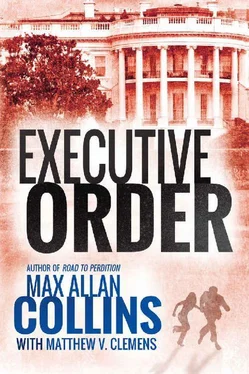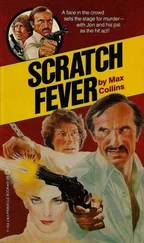Jimmy Carter, thirty-ninth President of the United States of America. Served 1977–1981. Recipient of the 2002 Nobel Peace Prize for his contributions with the Carter Center.
Patti Rogers joined Reeder who, hands on hips, stood before their taped-in-a-kitchen-chair prisoner.
Sweat beaded Morris’s forehead, though it wasn’t particularly hot in the loft apartment. Fear practically radiated off the accountant. Rogers knew the feeling — even the captors here were in a tight, untenable place.
Reeder said, “I’m listening.”
Morris swallowed and the earnestness he summoned was almost painful to see. “I wasn’t there when your agent was taken. But I have a good idea where she’s being held.”
“Still listening,” Reeder said.
“Then... we have a deal?”
“A deal?”
Morris nodded; sweat flew. “I tell you where I think she’s being held, and you let me go. You do that because if I were to tell my people I’d been captured, they might consider me compromised, and that could be fatal.”
“You give us an address,” Reeder said, a faint smile tracing his lips, “and we let you walk? That it? After all, you acted in good faith.”
“Yes!”
“No,” Reeder and Rogers answered as one.
“Then... then what incentive is there for me to help you? And please don’t insult any of our intelligence by racking that weapon and threatening me with a hole in the ground. I think we’re past that.”
Rogers said, “Are we?”
Reeder resumed his seat in the chair that faced the captive. “Here’s how this is going to play out. You tell us where you think they have Agent Nichols. We go check it out. If we don’t die in the attempt, and actually free her, we return to discuss your future.”
“What... what kind of future?”
Rogers said, “You’ll be lucky to have any. Seven Americans have died already.”
Morris summoned an air of confidence, though he was trembling. “That’s what I mean — you consider me a traitor. From my point of view, I’m a patriot. What I propose is that if you’re successful in your rescue, we all go our separate ways, no harm, no foul.”
This coming from a man taped in a kitchen chair.
Reeder said, “That’s a possible outcome.”
Rogers would have rather thrown this excuse for a human down those fire-escape stairs, chair and all. But she would follow Reeder’s lead.
“Where?” Reeder asked.
“Burke. Burke, Virginia. It’s... kind of out of the way.”
“What makes you think she’s there?”
Morris relaxed within his bonds; he seemed assured of the information he was about to share.
“I was given the task,” he said, “of pinpointing government safe houses that are seldom in use. That was a part of my normal work for the GAO — looking for properties that could be sold off by agencies that no longer used them. One of these was a house the ATF used in Burke. 124 Jennings Circle.”
Rogers recorded that on her phone.
Morris went on: “The ATF hasn’t used it in over three years. The neighbors were getting suspicious, which often compromises a safe-house location. Anyway, I sent that message up the Alliance chain.”
“Sounds to me,” Reeder said, “like you might be handling any number of former safe houses.”
“That’s true,” Morris admitted. “But the house in Burke was not only the most recent example, it inspired a number of follow-up questions. Something was obviously being planned for that address — my guess? Holding your agent there is it.”
Rogers traded looks with Reeder — despite the People Reader’s usual blank expression, she could tell he found this promising. So did she. Of course, what else did they have...
“We’ll check it out,” Reeder said.
“And if you get your friend back?”
“Then we’ll talk.”
“We have a deal , remember.”
“One thing at a time.”
Rogers put the blindfold back on Morris.
“Aw, come on!” the prisoner said.
She said, “Hush,” and walked away.
They gathered around Miggie. His tablet had some vintage Latin music going, which he cranked to keep their already hushed conversation private.
“Any word from Bohannon?” Reeder asked.
Miggie shook his head.
Reeder spoke to Rogers: “Nichols is your agent who’s gone missing. Take the lead.”
Rogers nodded and said, “All right — Joe and I will check out the safe house in Burke. With any luck, we’ll extricate Anne. Miggie, you keep digging. Reggie, watch the prisoner. We’ll keep you posted by cell. If we go dark longer than, say, four hours, take the charming Lawrence to Fisk and make a clean breast of it.”
Wade frowned. “I rather dump him on the street and make noises about how he gave up his crew.”
Reeder said, “No. If Rogers, Nichols, and I are casualties, our play is over. Letting the Bureau handle it is the better part of valor.”
Rogers shook her head at Reeder. “Joe, our new best friend over there says every sector of government is infiltrated. That would include the FBI.”
But Reeder’s answer went to Wade. “That’s why you’ll need to turn Lawrence over in as public and showy a way as possible. Preempt a cover-up. Go to the Post and give an interview. Contact every 24-hour news channel. Got it?”
The big man sighed big. “I got it. But why don’t you just bring Anne back instead?”
Everybody agreed that was the best idea.
Rogers touched Reeder’s arm. “Let me say good-bye to Kevin.”
“Sure.”
She went back to the bedroom, letting herself in as quietly as possible. The room was just beginning to lighten, the only window allowing in the first hints of sunrise.
Kevin, in dark shirt and slacks, was on the made bed on his side, asleep maybe.
She crept in, shut the door behind her. “You awake?”
He smiled up at her. “Still awake. Can’t sleep. Maybe I should have taken my nylons off.”
She almost succeeded in not laughing.
“Okay,” he admitted, “maybe it is a little funny.”
She sat on the edge of the bed, found his hand. “Thank you for what you did tonight.”
“I kind of enjoyed it. Nice to know I can fool a straight guy like that, not just be some camp oddity.”
“But you’re a straight guy — kind of.”
“And you’re a straight girl — sort of.”
“Made for each other,” she said, and leaned in and kissed him a little. He sat up and kissed her more.
Then she put her hand in his short dark curly hair and said, “Now I need you to do what you were going to before this sting came up — disappear for a while.”
He sat up even more. “I’d rather hang, and help. I proved I can do that, right?”
“No proof necessary. You’re all man.”
“Except maybe for the nylons.”
“And the eyeliner.”
“That, too. So you want rid of me?”
“Just till the guns are gone. Just till having you around doesn’t worry me and make me lose my edge. You need to doll up and get Virginia Plain’s pretty behind out of here. Catch a cab. Grab a bus. I don’t want to know where you’re headed.”
“I’ve got that phone Reeder gave me. You’ll call?”
“I’ll call.”
She touched his face, so handsome, so pretty, and gave him a smooch and got out of there. She didn’t need her eyeliner getting spoiled, too.
An hour later, the sun edging up, Rogers — with Reeder in the rider’s seat — drove the rental car to the far end of Jennings Circle in Burke, then turned around in the cul-de-sac and eased back the way she’d come. The rental had out-of-state plates, making her just a driver (should anyone notice) who’d taken a wrong turn. She rolled past the house a second time, slow as she dared, before turning off Jennings Circle and back onto Old Keene Mill Road.
Читать дальше












